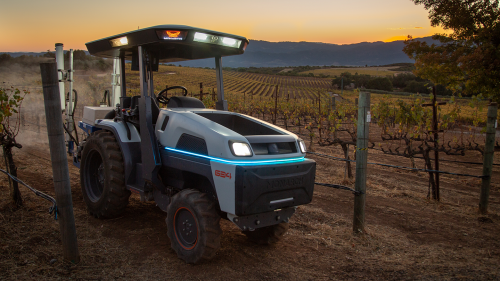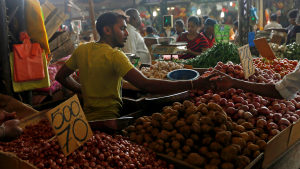Cosmic Harvest, Something's Fishy, and Growing Meat
Check out our roundup of the week's top news and research in food, agriculture, and global development.

Top Story
Access to Drinking Water in Doubt
Access to drinking water is no longer guaranteed in some Tunisian cities. Tunisian authorities have started cutting off drinking water at night to reduce consumption amid the country’s severe drought. The decision threatens to worsen already high social tensions caused by poor public services, high inflation, and a weak economy, and could cause further harm to farms dependent on the country’s dwindling water supply.
Council Insights
Global Hunger
“Nobody should have to be dying of hunger now, particularly in the 21st century,” said Senior Fellow Roger Thurow in the latest episode of the International Livestock Research Institute’s Boma Podcast. Listen to the full episode to learn more about Thurow’s insights on the politics of global poverty and hunger.
 Food and Agriculture
Food and Agriculture
Food & Agriculture
No More Mad Cows
Japan is lifting the last of its restrictions against Canadian processed beef imports, 20 years after bovine spongiform encephalopathy disease—often called mad cow disease—devastated the country's cattle industry. Japan is now Canada's second-largest market for beef, with exports worth $518 million in 2022.
Something’s Fishy
Millions of fish died in the Darling River near the Australian town of Menindee, transforming the river that New South Wales locals rely on for drinking and bathing into an ecological wasteland. Authorities say the mass death was caused by a lack of oxygen in the water, called hypoxia, which is a result of recent floods and a heat wave. The Murray Darling Basin, a vast network of lakes and rivers stretching across four states in eastern Australia, sustains over 40 percent of the country’s agriculture and dozens of communities along its banks.
Growing Meat
Italy's government approved a bill banning laboratory-produced food and animal feed, highlighting Italian food heritage and health protection. The proposal bans synthetic foods produced from animal cells and applies to lab-produced fish and artificial milk. Prime Minister Giorgia Meloni has pledged to shield Italy's food from technological innovations seen as harmful and renamed the agriculture ministry the "ministry for agriculture and food sovereignty."
Big Ag Leaves Moscow
One of the most prominent western shippers of Russian grain, Cargill Inc., will halt purchases for export in a shift that will give local firms more control over shipments. Cargill will stop exporting grain sourced by Russian companies by July. Russia has been making it increasingly difficult for foreign traders to obtain the paperwork necessary to export their grain, as the country works to gain control over its commodity shipments.
Deeper Dive
What Is the Role of the War in Ukraine on Grain Exports?
Grain exports from Ukraine for the 2022 to 2023 season are down nearly 18 percent to 36.9 million tons as of March 27 due to a smaller harvest and ongoing difficulties caused by Russia’s invasion . The war devastated grain producers in Ukraine, with the Black Sea Grain Initiative providing only partial relief. On the other hand, Ukraine’s tariff-free access to the EU has caused a grain glut in neighboring countries, tanking the regional agricultural sector.
Resilience
Water in the Sky
A new initiative by a South African nonprofit organization is developing rainwater harvesting systems to sustain vertical gardens in urban areas. Designed to alleviate hunger and water insecurity, the project directly addresses the country’s high levels of food insecurity. Run by students, it also engages youth in agriculture to help combat the rising average age of farmers.
DC Report
Water Rules Veto
Senate Republicans passed a bill to overturn the controversial Waters of the US rule under the Clean Water Act, sending President Biden a bill that is expected to be his second veto. The measure passed the Democratic-led Senate on a 53-43 vote, with agricultural groups among some of the most ardent critics of the latest attempt to define the waters of the US rule. Farming groups argue that the new rule is too broad and could lead to federal regulation of streams and low spots on farmland.
Big Actors
Automated Farming
Major agricultural companies like Caterpillar, Deere & Co., and Parallel Systems have introduced new technology to the farming industry: autonomous vehicles. Inspired by the shortage of truck drivers and skilled machine operators, the companies’ self-driving trucks, tractors, and bulldozers are helping reduce costs and improve productivity.
Big Ideas
Cosmic Harvest
The UN’s FAO and the International Atomic Energy Agency are preparing to analyze and test the effects of sending seeds to space for the first time in 60 years. The seeds, sent to space in November 2022, included thale cress and sorghum, known for their drought and heat tolerance. The experiment aims to develop new crops that can withstand climate change and help improve global food security.
Ask an Expert
Is the world on track to reach the UN Sustainable Development Goals for zero hunger and clean water and sanitation?
"The recent UN World Water Development Report marks global progress halfway through the timeline for hitting the Sustainable Development Goal targets. And what we're seeing is that we're falling far short of those goals for safe human water access and environmental protection. There's a tendency to think that this is not a problem for high-income places like the United States, but the recent chemical spill in Philadelphia's water supply reminds us that drinking water safety is a persistent problem here as well. There are many well-known chemical hazards in the American drinking water system that are either unregulated or ineffectively controlled. This is a continuous threat to our health that persists even when disasters like those in Philadelphia or Flint fade from public attention."
— Nonresident Fellow Dr. Michael Tiboris


Have a question about food and agriculture? Ask one of our experts at the Center on Global Food and Agriculture to get an answer in next week's Global Food for Thought!
Council Events
Did you miss one of our previous livestreams? Don't worry! They are all available on our website to watch at any time.
Other Upcoming Events
Global Food Policy Report: Rethinking Food Crisis Responses
Date: April 13
Time: 9:00 – 10:30 a.m. ET
IFPRI-AMIS Seminar Series: Production Prospects for the Northern Hemisphere
Date: April 18
Time: 9:00 – 10:30 a.m. ET
IFAD at the Perugia International Journalist Festival: Spotlight on Indigenous Peoples
Date: April 22
Time: 3:00 p.m. CET
2023 Hunger and Health Illinois Conference – Chicago
Date: May 1
Time: 10:00 – 3:30 p.m. CT
2023 Food Waste Solutions Summit
Date: May 16 – 18
Land Acknowledgement Statement
The Center on Global Food and Agriculture recognizes it occupies the ancestral land of the Kiikaapoi, Peoria, Kaskaskia, Bodwéwadmi, and Myaamia people. Indigenous communities around the world disproportionately experience the pressures of climate change, global conflicts, and the COVID-19 pandemic, while simultaneously stewarding 80 percent of the world’s biodiversity. These Indigenous tribes and nations are the original owners of this land and continue to be systemically erased by policies and practices that ignore their histories. To learn more about Indigenous foodways and practices, check out our 2022 blog series "Stewardship, Sovereignty, and Solutions."
Related Content
- Embracing Dandelions as Food and Medicine
- Going Beyond Regenerative Agriculture on Tribal Lands
- Expanding "638" to Enhance Native American Food Sovereignty
- Flavors and Culture: Food Systems Through Indigenous Women's Eyes
- A Thanksgiving Legacy: Fighting for Indigenous Food Sovereignty
- Native Food Sovereignty: Strengthening Connection to Culture
- Reconnecting to Indigenous Food Sovereignty Values and Practices
- Embracing Interconnectedness: How Indigenous Foodways Can Save Us





